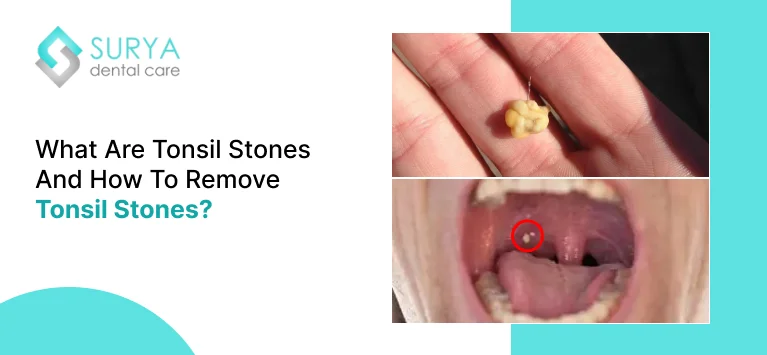Tonsil Stones are tiny white or yellow coloured hard lumps located on your tonsils. These stones on the tonsils are usually small but are possible to get large. So, in most cases, it can be dislodged from home remedies, and in very rare cases, it requires antibiotics or surgery.
Tonsil stones do not cause any pain or harm, but they could cause bad breath, sore throat, ear pain and bad taste. Overall tonsil stones are a more disturbing condition than a painful condition.
Read this article to learn more about what tonsil stones are, the symptoms of tonsil stones, how to remove tonsil stones at home and how to prevent tonsil stones.
What are Tonsil Stones?
Tonsil stones are small, hard formations that form in the crevices or crypts of your tonsils as white or yellow-coloured clumps. These clumps are calcified deposits made up of trapped food particles, dead cells, mucus, and minerals such as calcium and magnesium.
Over time, these deposited materials harden and form tonsil stones in the crevices or crypts of your tonsils. Tonsil stones, in medical terms, are known as tonsilloliths.
Symptoms of Tonsil Stones
Most people do not know that they have tonsil stones and may not even experience any symptoms. However, there are several symptoms of tonsil stones. They are,
- Bad Breath (Halitosis)
- Sore Throat
- Difficulty Swallowing
- White or Yellow Lumps
- Ear Pain
- Tonsil Swelling
- Coughing or Gagging
- Metallic Taste
How to Remove Tonsil Stones at Home
Even though tonsil stones are harmless in most cases, they still could cause discomfort, bad breath, and irritation, so if you wish to remove them at home. No problem, it can be easily dislodged at home by using safe and effective methods. They are,
Gargling with Salt Water
Saltwater gargles can help dislodge smaller tonsil stones and reduce any associated discomfort or swelling.
Mix half a teaspoon of salt in a glass of warm water, gargle thoroughly, and spit it out. This can also help kill bacteria and freshen your breath.
Using a Cotton Swab or Finger
Gently pressing on your tonsils with a cotton swab or a clean finger can help push out the stones.
Ensure your hands are washed, and the swab is sterilized to prevent infection. Be gentle to avoid injuring the delicate tissue around your tonsils.
Drinking Plenty of Water
Staying hydrated helps prevent the buildup of debris in your tonsillar crypts and may help flush out smaller stones naturally.
Using Oral Irrigators
A water flosser or oral irrigator set to a low-pressure setting can help dislodge tonsil stones. Point the nozzle carefully at the tonsils to remove debris. Avoid high-pressure settings to prevent damage.
Eating Crunchy Foods
Crunchy foods like carrots or apples help loosen and expel stones naturally while you chew.
Maintain Good Oral Hygiene
Brushing your teeth and tongue twice daily and using an antibacterial mouthwash can reduce the bacteria and debris that contribute to tonsil stone formation.
Risk Factors of Tonsil Stones
Anyone could get affected by tonsil stones. But you’re more likely to get affected by tonsil stones. If you have,
- Poor Oral Hygiene: Increases the buildup of bacteria and debris in the mouth.
- Chronic Tonsillitis: Frequent tonsil infections can lead to deeper crypts, increasing the risk.
- Large Tonsils: Larger tonsils often have deeper crypts that trap debris easily.
- Dry Mouth: Lack of saliva promotes bacterial growth and debris accumulation.
- Smoking: Encourages bacterial buildup and irritation in the throat.
- Dairy-Rich Diet: Excess mucus from dairy consumption can contribute to stone formation.
- Age: Teenagers and young adults are more prone to tonsil stones.
- Allergies or Sinus Issues: Excess mucus production can lead to debris collecting in the tonsils.
How Do I Prevent Myself From Tonsil Stones
You can prevent yourself from tonsil stone formation by maintaining good oral hygiene habits:
- Brush your teeth and tongue twice daily.
- Use an antibacterial mouthwash regularly.
- Gargle with warm salt water to clear debris.
- Stay hydrated by drinking plenty of water.
- Avoid smoking to reduce bacterial growth.
- Limit dairy intake to reduce mucus production.
- Eat crunchy foods to naturally clean tonsils.
- Maintain overall good oral hygiene habits.
When to consult a Doctor For Tonsil Stones
In most of the cases tonsil stones do not require any treatments. However, you need a doctor consultation in the below situations,
- If tonsil stones cause persistent bad breath or discomfort.
- When you experience frequent or recurring tonsil stones.
- If tonsil stones lead to difficulty swallowing or breathing.
- When you notice swelling, redness, or severe pain in the tonsil area.
- If home remedies fail to dislodge the stones.
- When tonsil stones are associated with frequent throat infections.
- If you suspect an abscess or infection around the tonsils.
- When they interfere with your daily activities or quality of life.
Takeaway
Tonsil stones are a harmless condition that can be dislodged at home using effective and safe ways. In rare cases, tonsil stones require doctor consultation on taking antibiotics or surgery to dislodge them. In such cases, contact surya dental care for doctor consultation.
FAQs
Yes, tonsil stones can often be seen in the back of the throat, especially if they are larger. They may appear as white or yellowish lumps on the tonsils, and individuals can sometimes spot them using a mirror with good lighting.
Tonsil stones form in the crevices of the tonsils, specifically within the tonsillar crypts. These crypts are small pockets that trap debris such as food particles, dead cells, and bacteria, which can harden and create stones over time.
Tonsil stones typically appear as small white or yellow lumps on the tonsils. They can vary in size, from tiny specks to larger formations that may protrude from the tonsils. Their color and size can make them noticeable, especially when they are larger.
You can remove tonsil stones by gargling with warm salt water, which helps dislodge them and reduce inflammation. Other methods include using a cotton swab to gently push them out, employing a water pick for irrigation, or coughing forcefully to loosen them. Regular oral hygiene also helps prevent their formation.
Tonsil stones form when bacteria, food particles, and other debris accumulate in tonsil crypts and calcify over time. Poor oral hygiene can contribute to their development.
Oil pulling may help reduce bacteria but doesn't directly remove tonsil stones. Its effectiveness is anecdotal and not scientifically proven.
Dentists typically don't remove tonsil stones; an ENT specialist is usually consulted for removal. Dentists can provide oral hygiene advice.
Tonsil stones can cause discomfort, bad breath, and a sensation of something stuck in the throat. They usually don't cause significant pain but can be irritating.
Use an oral irrigator by gently aiming it at the tonsils to dislodge stones. Adjust the pressure to avoid discomfort and ensure thorough cleaning.
Identify tonsil stones by looking for small white or yellow pebbles on your tonsils. Symptoms include bad breath, a sore throat, and a feeling of something stuck in the throat.








Leave a Comment